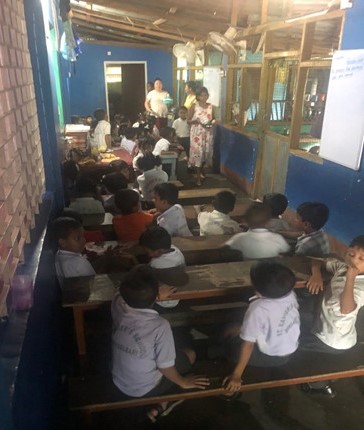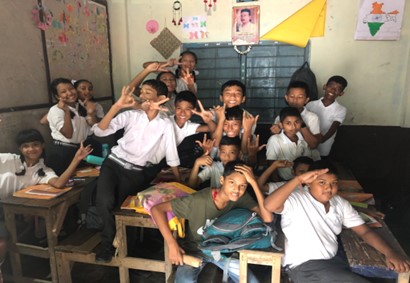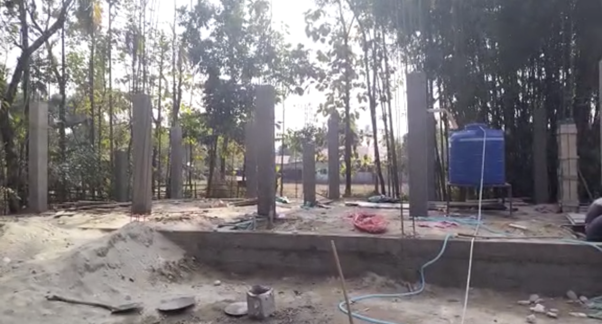This BPI blog post was written by Sebastian Constable, a final year BSc Economics Student at the University of Bristol. In this post Sebastian shares his experience teaching at a school in rural West Bengal, India before he started his course at Bristol. He writes about the school system in India, including the role some schools actively play in accommodating children living below the poverty line.
In 2019 I spent six months teaching at St. Xavier’s English School in Chalsa, Rural West Bengal. When my girlfriend and I returned to St. Xavier’s for a month long visit in 2022, I realised how much has changed since my previous visit. The school’s growing intake has forced the youngest three years (Nursery, Lower Kindergarten, and Upper Kindergarten) off-site, into the school hostel, where the Principal’s family, some staff, and eighteen students currently live, and where we also called home during our stay.
Every day this summer we were woken up by the shouts of raucous 4-year-olds, serenading us with their morning nursery rhymes. The door of our bedroom led straight onto the corridor where nursery was held, forcing us to manoeuvre through a sea of toddlers and their bags as we journeyed to breakfast.

We would spend our days at the school, either doing arts and crafts with the students in preparation for the fundraiser or teaching English: recapping the different tenses, how to form questions, and writing thrilling horror stories!
Outside of class, the children constantly wanted to be read to or taken to the ground to play football, so we had a lot of fun messing around too. The Principal’s bantering personality, matched with his eagerness to learn, hadn’t changed one bit. He would be constantly asking the definition of complex words, or making fun of our silly ways. Teacher friends cooked us delicious meals, and took us to meet their families in the mountains, while former students returned to visit us and catch up over tea.
The school’s commitment to education is reflected in its values. For example, upon returning we found out that one of our most promising former students, Swati (aged 13), had been forced to leave the school due to her mother’s death and instead worked in a tea garden for the equivalent of £7.20 per week. We arranged to visit her with the Principal, who spoke to her father and agreed to allow her to move back into the school hostel and resume her studies for free.
The diverse school, hosting Adivasis, Bengalis, Hindis, and Nepalis, with students breaking from their English medium education into their respective vernacular classes, was set up independently by the Principal.
In this part of India, free state schools have between 80-100 students in one class, without the option to learn in English – all classes are taught in Hindi. The children explain how those at the front can learn, while the others can’t hear, begin to talk, and are forgotten about. Moreover, to maintain control over so many students, silent study, copying work from the board and learning it by rote, is enforced with corporal punishment. Hence, visionary independent schools, which bring opportunities to children who otherwise would have no meaningful chance of progressing their education, contain enormous value. Overcoming such a lack of active student engagement, vivacious debate, and creative exploration is fundamental to St. Xavier’s vision, where everything possible is being done to keep class sizes small.

The school fees are between 400-700 Rupees a month, depending on the age of the student, which roughly equates to between £4-7, and allows the pupils to access high quality teaching, music lessons, karate and other sports sessions, as well as annual programmes, such as Sports and Independence Day celebrations.
In line with Indian Government guidelines, 25 of the school’s 400 students study for free. On top of this, Prem Lepcha, the Principal, provides free education to an additional 50 students and free accommodation to 10 of the 18 hostellers, all of whom, as the Principal explained to us, live below the national poverty line. The other students living in the hostel pay between 2000-4000 Rupees in total per month for their accommodation and education, according to what their parents earn.
As evident in Swati’s case, without this school, and the hostel which allows them to live on-site, many students would face a life of menial work and very low wages. The hostel houses many people who would be otherwise outcast from society: those with divorced parents or vulnerable individuals, with few remaining relatives. Moreover, the school is fairly unique in the fact that it is English Medium which opens many doors for the students’ future prospects.
Recognising that the hostel is becoming an impractical place to learn and an uncomfortable place to live, my girlfriend and I were driven to create an ambitious fundraising project to help improve the situation. The children enthusiastically made bracelets, necklaces, and cards for us to sell in the UK as part of these fundraising efforts.
We have sent the first round of funds to the headteacher, and building work has commenced on a plot of land just behind the existing building. The school is very excited about the project, with the Principal expecting new admissions due to the improvements. All seven of the new classrooms will be 20 x 25 feet, in line with government guidelines. In addition there will be a nursery playroom, and an outdoor playground, ensuring that the students have more space to learn creatively.

With my girlfriend receiving a place on a Master’s course with a term taught at Jawaharlal Nehru University (JNU) in Delhi, we are excited to be returning to India in 2024, and are eagerly awaiting a chance to visit all our friends and the new building in Chalsa.
If this initiative is something you would like to support, Sebastian invites you to visit their fundraising page.
As part of Dr Zahra Siddique’s Economics of Developing Countries course at the University of Bristol, Sebastian is carrying out a group project which analyses the labour market implications of vocational education in India.
